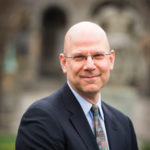2016 Graduate Education
THIS GUIDE IS NO LONGER ACTIVE. For the current FP Guide, click here.
Georgetown University, Walsh School of Foreign Service
“The nature of international affairs training is changing,” says Joel Hellman, dean of Georgetown University’s Walsh School of Foreign Service (SFS). He notes that students experience growing pressure to combine their interest in international affairs with more specialized training, while professionals in different specialties can increasingly benefit from training in international affairs.

Georgetown University
Hellman believes that interdisciplinary academic approaches can help address some of the most pressing global challenges. “The world of public policy has trouble dealing with the crises in front of it,” he says. “For many of the problems we’re confronting globally, we really don’t have answers. We need stronger, deeper analysis.”
Hellman sees a role for SFS in helping to prevent crises by diving further into theory and research with an understanding of practice. “Our location in Washington, D.C., grants students access to practitioners both inside and outside the classroom,” he says. “We are thinking about how we can bring different skills together to help think through solutions that will make a big impact in the world,” Hellman says.
For many of the problems we’re confronting globally, we really don’t have answers. We need stronger, deeper analysis.At the same time, Hellman notes, SFS’s eight graduate programs have been drawing an increasingly sophisticated group of students with a wide range of career interests. “While we’re proud that we’re still the largest feeder into the U.S. Foreign Service, this is not just a school for diplomats. The skills that SFS students learn in diplomacy, negotiation, cross-cultural understanding, and more are skills that are increasingly in demand in every sector. This allows students to make a difference no matter what path they choose after graduation,” says Hellman.

Joel Hellman
SFS students benefit from small classes, along with support and in-depth engagement with faculty, staff and peers in the school’s MS in Foreign Service, MA in Security Studies, Master’s of Global Human Development, and five regional MA programs. Hellman notes that students get the added benefit of being part of a relatively small cohort within the larger graduate SFS population, which offers more than 100 full-time faculty members, a wealth of career center resources, and an alumni community spanning more than 100 countries around the world.
Hellman’s reflections are part of a multiyear effort that will build to the 2019–2020 academic year, marking the 100th anniversary of SFS.
Anthony Clark Arend, senior associate dean for graduate and faculty affairs, notes, “Just as SFS was created to respond to the uncertain and tumultuous world of 1919, so today the school is constantly changing and adapting to the uncertainties of the current global system.”
Hellman adds, “SFS is the oldest and one of the best schools specializing in international affairs, and it’s in the best city to study international affairs. We’re proud of that legacy. As we move into our next 100 years, we want to continue to work with our students to engage in the world’s most complex issues.”
Contents
- 2016 Graduate Education
- Association of Professional Schools of International Affairs (APSIA)
- Boston University, Frederick S. Pardee School of Global Studies
- Central European University (CEU), School of Public Policy (SPP)
- Columbia University, School of International and Public Affairs (SIPA)
- The Fletcher School of Law and Diplomacy at Tufts University
- Georgetown University, Walsh School of Foreign Service (SFS)
- Indiana University, School of Global and International Studies
- Johns Hopkins University, School of Advanced International Studies (SAIS)
- Seton Hall University, School of Diplomacy and International Relations
- University of Kent, Brussels School of International Studies (BSIS)
- University of Minnesota, Humphrey School of Public Affairs
- The University of Texas at Austin, Lyndon B. Johnson School of Public Affairs
- University of Washington, Jackson School of International Studies